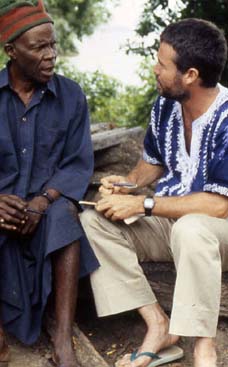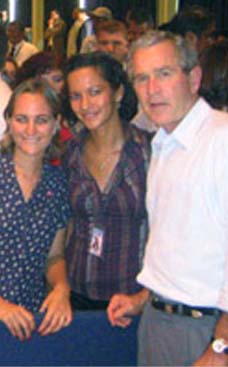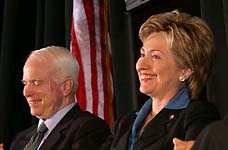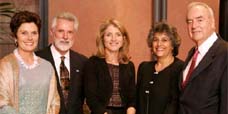
"Those of us who committed ourselves to being Peace Corps teachers in rural Malawi more than 40 years ago are dismayed by what we see on our return visits and by all the news that has been reported recently from that unlucky, drought-stricken country. But we are more appalled by most of the proposed solutions." Author Paul Theroux served as a Peace Corps Volunteer in Malawi in the 1960's.
Paul Theroux says "It seems to have been Africa's fate to become a theater of empty talk and public gestures."
The Rock Star's Burden
By PAUL THEROUX
Published: December 15, 2005
THERE are probably more annoying things than being hectored about African development by a wealthy Irish rock star in a cowboy hat, but I can't think of one at the moment. If Christmas, season of sob stories, has turned me into Scrooge, I recognize the Dickensian counterpart of Paul Hewson - who calls himself "Bono" - as Mrs. Jellyby in "Bleak House." Harping incessantly on her adopted village of Borrioboola-Gha "on the left bank of the River Niger," Mrs. Jellyby tries to save the Africans by financing them in coffee growing and encouraging schemes "to turn pianoforte legs and establish an export trade," all the while badgering people for money.
It seems to have been Africa's fate to become a theater of empty talk and public gestures. But the impression that Africa is fatally troubled and can be saved only by outside help - not to mention celebrities and charity concerts - is a destructive and misleading conceit. Those of us who committed ourselves to being Peace Corps teachers in rural Malawi more than 40 years ago are dismayed by what we see on our return visits and by all the news that has been reported recently from that unlucky, drought-stricken country. But we are more appalled by most of the proposed solutions.
I am not speaking of humanitarian aid, disaster relief, AIDS education or affordable drugs. Nor am I speaking of small-scale, closely watched efforts like the Malawi Children's Village. I am speaking of the "more money" platform: the notion that what Africa needs is more prestige projects, volunteer labor and debt relief. We should know better by now. I would not send private money to a charity, or foreign aid to a government, unless every dollar was accounted for - and this never happens. Dumping more money in the same old way is not only wasteful, but stupid and harmful; it is also ignoring some obvious points.
If Malawi is worse educated, more plagued by illness and bad services, poorer than it was when I lived and worked there in the early 60's, it is not for lack of outside help or donor money. Malawi has been the beneficiary of many thousands of foreign teachers, doctors and nurses, and large amounts of financial aid, and yet it has declined from a country with promise to a failed state.
In the early and mid-1960's, we believed that Malawi would soon be self-sufficient in schoolteachers. And it would have been, except that rather than sending a limited wave of volunteers to train local instructors, for decades we kept on sending Peace Corps teachers. Malawians, who avoided teaching because the pay and status were low, came to depend on the American volunteers to teach in bush schools, while educated Malawians emigrated. When Malawi's university was established, more foreign teachers were welcomed, few of them replaced by Malawians, for political reasons. Medical educators also arrived from elsewhere. Malawi began graduating nurses, but the nurses were lured away to Britain and Australia and the United States, which meant more foreign nurses were needed in Malawi.
When Malawi's minister of education was accused of stealing millions of dollars from the education budget in 2000, and the Zambian president was charged with stealing from the treasury, and Nigeria squandered its oil wealth, what happened? The simplifiers of Africa's problems kept calling for debt relief and more aid. I got a dusty reception lecturing at the Bill and Melinda Gates Foundation when I pointed out the successes of responsible policies in Botswana, compared with the kleptomania of its neighbors. Donors enable embezzlement by turning a blind eye to bad governance, rigged elections and the deeper reasons these countries are failing.
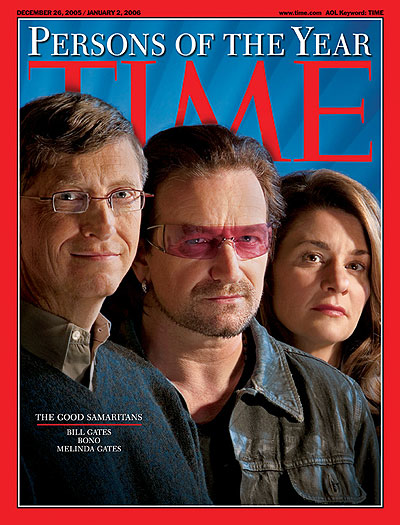
Mr. Gates has said candidly that he wants to rid himself of his burden of billions. Bono is one of his trusted advisers. Mr. Gates wants to send computers to Africa - an unproductive not to say insane idea. I would offer pencils and paper, mops and brooms: the schools I have seen in Malawi need them badly. I would not send more teachers. I would expect Malawians themselves to stay and teach. There ought to be an insistence in the form of a bond, or a solemn promise, for Africans trained in medicine and education at the state's expense to work in their own countries.
Malawi was in my time a lush wooded country of three million people. It is now an eroded and deforested land of 12 million; its rivers are clogged with sediment and every year it is subjected to destructive floods. The trees that had kept it whole were cut for fuel and to clear land for subsistence crops. Malawi had two presidents in its first 40 years, the first a megalomaniac who called himself the messiah, the second a swindler whose first official act was to put his face on the money. Last year the new man, Bingu wa Mutharika, inaugurated his regime by announcing that he was going to buy a fleet of Maybachs, one of the most expensive cars in the world.
Many of the schools where we taught 40 years ago are now in ruins - covered with graffiti, with broken windows, standing in tall grass. Money will not fix this. A highly placed Malawian friend of mine once jovially demanded that my children come and teach there. "It would be good for them," he said.
Of course it would be good for them. Teaching in Africa was one of the best things I ever did. But our example seems to have counted for very little. My Malawian friend's children are of course working in the United States and Britain. It does not occur to anyone to encourage Africans themselves to volunteer in the same way that foreigners have done for decades. There are plenty of educated and capable young adults in Africa who would make a much greater difference than Peace Corps workers.
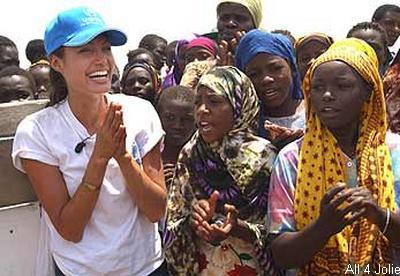
Africa is a lovely place - much lovelier, more peaceful and more resilient and, if not prosperous, innately more self-sufficient than it is usually portrayed. But because Africa seems unfinished and so different from the rest of the world, a landscape on which a person can sketch a new personality, it attracts mythomaniacs, people who wish to convince the world of their worth. Such people come in all forms and they loom large. White celebrities busy-bodying in Africa loom especially large. Watching Brad Pitt and Angelina Jolie recently in Ethiopia, cuddling African children and lecturing the world on charity, the image that immediately sprang to my mind was Tarzan and Jane.
Bono, in his role as Mrs. Jellyby in a 10-gallon hat, not only believes that he has the solution to Africa's ills, he is also shouting so loud that other people seem to trust his answers. He traveled in 2002 to Africa with former Treasury Secretary Paul O'Neill, urging debt forgiveness. He recently had lunch at the White House, where he expounded upon the "more money" platform and how African countries are uniquely futile.
But are they? Had Bono looked closely at Malawi he would have seen an earlier incarnation of his own Ireland. Both countries were characterized for centuries by famine, religious strife, infighting, unruly families, hubristic clan chiefs, malnutrition, failed crops, ancient orthodoxies, dental problems and fickle weather. Malawi had a similar sense of grievance, was also colonized by absentee British landlords and was priest-ridden, too.
Just a few years ago you couldn't buy condoms legally in Ireland, nor could you get a divorce, though (just like in Malawi) buckets of beer were easily available and unruly crapulosities a national curse. Ireland, that island of inaction, in Joyce's words, "the old sow that eats her farrow," was the Malawi of Europe, and for many identical reasons, its main export being immigrants.
It is a melancholy thought that it is easier for many Africans to travel to New York or London than to their own hinterlands. Much of northern Kenya is a no-go area; there is hardly a road to the town of Moyale, on the Ethiopian border, where I found only skinny camels and roving bandits. Western Zambia is off the map, southern Malawi is terra incognita, northern Mozambique is still a sea of land mines. But it is pretty easy to leave Africa. A recent World Bank study has confirmed that the emigration to the West of skilled people from small to medium-sized countries in Africa has been disastrous.
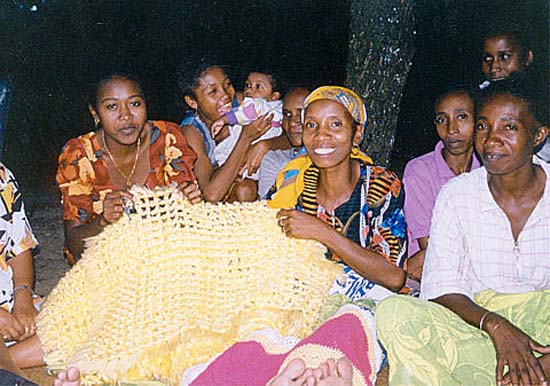
Africa has no real shortage of capable people - or even of money. The patronizing attention of donors has done violence to Africa's belief in itself, but even in the absence of responsible leadership, Africans themselves have proven how resilient they can be - something they never get credit for. Again, Ireland may be the model for an answer. After centuries of wishing themselves onto other countries, the Irish found that education, rational government, people staying put, and simple diligence could turn Ireland from an economic basket case into a prosperous nation. In a word - are you listening, Mr. Hewson? - the Irish have proved that there is something to be said for staying home.
Paul Theroux is the author of "Blinding Light" and of "Dark Star Safari: Overland from Cairo to Cape Town."





